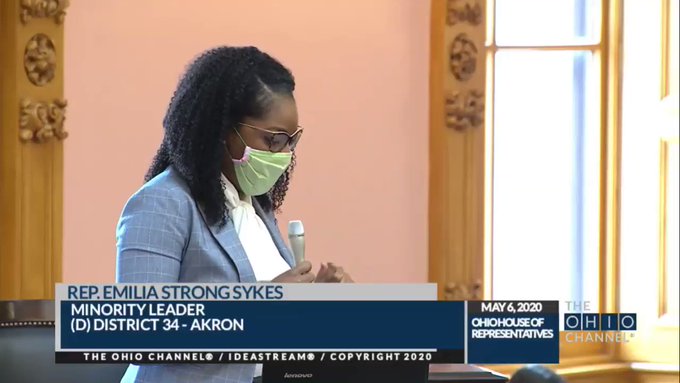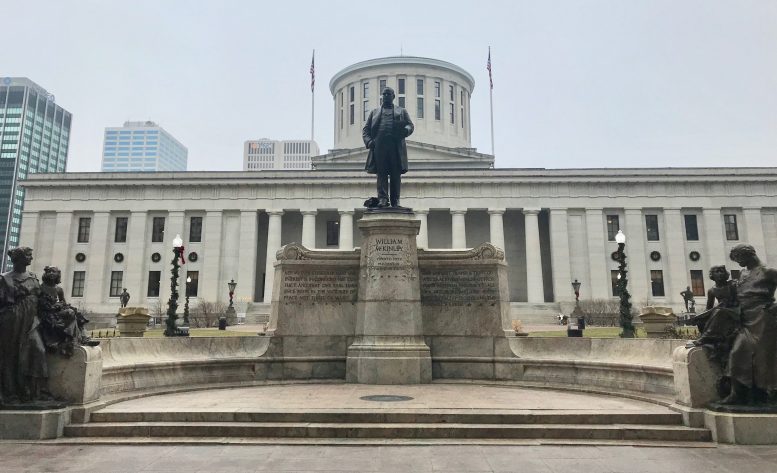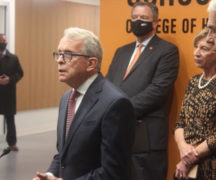A small group of Ohio legislators may be given the chance to put the state’s COVID-19 health orders to a vote.
The Ohio House of Representatives has approved a bill that would give that group authority to approve or reject certain orders from Dr. Amy Acton, the director of the Ohio Department of Health.
The vote was 58-37 in favor of the amended bill, with a few Republicans voting against. (State Rep. Haraz Ghanbari voted in favor.) It is not veto-proof, should Gov. Mike DeWine decide not to sign it.
The possibility of this action began on Wednesday morning in the Ohio House’s State and Local Government Committee. The committee brought up Senate Bill 1 for consideration, having not previously held a hearing on the bill since June 12. It is a bill largely unrelated to COVID-19 which deals with regulatory reform in Ohio’s state agencies.
The original bill passed in the Senate on a party-line vote last year. The chamber will need to vote again on this amended version from the House. Senate President Larry Obhof told reporters on Wednesday his chamber would “look at what the House sends us.”
The House’s amendment would allow the Joint Committee on Agency Rule Review (JCARR) a chance to consider Acton’s health orders under certain conditions. JCARR is made up of 10 legislative members — five in the Ohio House of Representatives and five in the Ohio Senate.
Orders made by the health department director lasting up to 14 days would be allowed to stand unimpeded. Any order beyond 14 days would, under this amended bill, trigger a review from JCARR members. The bill specifies these conditions are effective as of April 29 onward — thus including Acton’s most recent extension of the stay-at-home order through the end of this month.
The bill would require approval from three of the five JCARR members in each chamber to let a health order stand. Republicans, by virtue of having supermajorities in both chambers, hold three of the five spots in each grouping.
One of those members on the Senate side is Ohio Sen. Andrew Brenner, R-Powell. Brenner spurred controversy last month after saying he would not let Acton, who is Jewish, turn Ohio into Nazi Germany with her health department orders. Brenner was widely condemned by officials in both parties, including Senate President Larry Obhof and Gov. Mike DeWine.
As a critic of Acton’s policies, Brenner would theoretically have a chance to strike down her orders if this bill is enacted.
The amended bill passed the Ohio House of Representatives on Wednesday in a party-line vote, with Republicans voting in support. All three Republican members of JCARR voted in favor, indicating they may choose to override Acton’s orders if given the chance. The three are Reps. Dick Stein of Norwalk, Brett Hudson Hillyer of Uhrichsville and Jamie Callender of Concord.
The two Democratic members from the House include Reps. Kristin Boggs (the assistant minority leader of Columbus) and Michael Skindell of Lakewood. Skindell is a member of the State and Local Government Committee and spoke out directly against the amendment.
Besides Brenner, the other four JCARR members from the Ohio Senate include Republicans Stephanie Kunze of Hilliard and Theresa Gavarone of Bowling Green, along with Democrats Sandra Williams (the assistant minority whip of Cleveland) and Hearcel Craig of Columbus.
Kunze and Gavarone are both up for re-election this November and could be put in a difficult position if JCARR does indeed vote on Acton’s orders. Kunze in particular would be under a microscope, as her suburban district is a key target for Ohio Democrats this year.
Kunze declined to comment to an Ohio Capital Journal reporter on Wednesday regarding this issue.
Legislative oversight or defending Dr. Acton?
House members debated the amended bill in a lengthy session Wednesday afternoon.
Many Republicans have been sharply critical of DeWine and Acton in recent weeks, though they took a 30,000-foot view during the House floor debate. They did not disparage the two, nor did they speak to the merits of voting for or against Acton’s orders should a JCARR decision be necessary.
Instead, they spoke generally about the separation of powers and the need to provide “legislative oversight.”
“If you support increased government transparency, if you believe in legislative oversight, you should support substitute Senate Bill 1,” said Rep. Scott Wiggam, R-Wooster, who chairs the State and Local Government Committee.
Democrats stuck to framing the debate in COVID-19 terms. They praised the state’s response to the pandemic and highlighted Acton’s role in particular. Members said the legislature should not seek to curb her executive authority, particularly while the response is ongoing.
House Minority Leader Emilia Strong Sykes, D-Akron, spoke at length against the bill. She referenced the prior complaints from Speaker of the House Larry Householder, R-Glenford, regarding his caucus feeling “disrespected” by not being properly heard by DeWine:Tyler Buchanan@Tylerjoelb
WATCH: House Minority Leader @EmiliaSykesOH speaks out against GOP effort to curb Dr. Acton’s executive power.
She quoted and responded to Speaker Householder’s claim of feeling “disrespected” by DeWine administration:

69Twitter Ads info and privacy30 people are talking about this
Sykes issued an even stronger statement following the vote:
“This is what happens when a single party of mostly men are permitted to dominate both chambers of the state’s legislature – their fragile egos are hurt that a woman has more power and is more relevant than they are,” Sykes stated.
Obhof and DeWine respond
The Ohio Senate met on Wednesday, with the session wrapping up in between the committee’s approval of the amendment and the House’s eventual vote to pass it.
Senators are not scheduled to convene for another session until May 13.
In a gathering with reporters on Wednesday, the senate president spoke at length about the legislative oversight proposal and about his chamber’s involvement with the COVID-19 response.
Obhof said the legislature “should revisit” the statute giving Acton the health authority used to issue these health orders. Obhof stopped short of lending support to the House’s measure, though, saying he and other senators had only read the proposed language earlier that morning.
“I think certainly during my tenure as president we’ve been protective of the legislative prerogative,” he said generally.
Obhof has been far more complimentary of DeWine and Acton’s response to COVID-19 than his counterpart in the other chamber.
“I think that, overall, Ohio has had a very positive response compared to many other states,” Obhof said, adding this went both for the health response and the economic response.
Asked why his view differs so much from Householder’s, Obhof said, “I can’t speak to anyone else’s experience.” But he did say the governor has been “very open” and “very responsive” to state senators’ concerns throughout this ordeal.
He said his caucus does not agree with the DeWine administration on everything, but added “that’s OK” so long as the two sides are “working toward the same common good.”
Here was the full statement from DeWine’s office following the House vote;
“My administration is focused on the important things we need to do to help businesses responsibly reopen while protecting Ohioans’ health and safety. This week alone, this included increasing coronavirus testing and tracing, balancing Ohio’s budget, and working on plans to move Ohio’s economy forward. Ohioans need their legislators focused on these important issues. Creating more uncertainty regarding public health and employee safety is the last thing we need as we work to restore consumer confidence in Ohio’s economy.”





